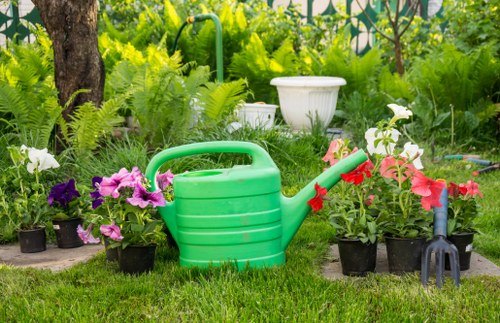Garden Maintenance in Highgate
Maintaining a beautiful garden in Highgate requires a combination of knowledge, dedication, and the right tools. Whether you're a seasoned gardener or a beginner, understanding the unique climate and soil conditions of Highgate can make all the difference in keeping your garden thriving year-round.
Highgate's temperate climate provides an excellent environment for a wide variety of plants. However, to achieve optimal growth and health, it's essential to implement regular garden maintenance practices. From pruning and weeding to soil enrichment and pest control, each task plays a crucial role in creating a vibrant and sustainable garden.
One of the most important aspects of garden maintenance is understanding the seasonal changes. Highgate experiences distinct seasons, each bringing its own set of challenges and opportunities for garden care. By adapting your maintenance routine to the seasons, you can ensure that your garden remains lush and colorful throughout the year.

Essential Garden Maintenance Tasks
Regular garden maintenance involves a variety of tasks that contribute to the overall health and appearance of your outdoor space. Here are some essential tasks every Highgate gardener should prioritize:
- Pruning: Removing dead or overgrown branches helps promote healthy growth and prevents diseases.
- Weeding: Keeping weeds under control is vital for preventing them from competing with your plants for nutrients and water.
- Soil Care: Regularly testing and amending the soil ensures that your plants have the necessary nutrients to thrive.
- Pest Control: Monitoring for pests and implementing natural or chemical controls as needed protects your garden from infestations.
- Irrigation Management: Efficient watering practices conserve water and ensure your plants receive adequate moisture.
Implementing these tasks systematically will help you maintain a healthy and attractive garden in Highgate. Each task should be tailored to the specific needs of your plants and the conditions of your garden.
In addition to these essential tasks, seasonal maintenance activities can further enhance the vitality of your garden. For example, spring is an ideal time for planting new flowers and vegetables, while autumn is perfect for preparing your garden for the winter months.

Seasonal Garden Maintenance
Understanding and adapting to the changing seasons is key to successful garden maintenance in Highgate. Each season presents unique challenges and opportunities that require specific maintenance strategies.
Spring
Spring is the time for renewal and growth. As the weather warms, it's essential to prepare your garden for the upcoming growing season.
Tasks:
- Soil Preparation: Test and amend the soil with compost or fertilizers to provide nutrients for new plant growth.
- Planting: Plant flowers, vegetables, and shrubs that thrive in Highgate's spring climate.
- Pruning: Trim back any winter-damaged branches to encourage healthy new growth.
By addressing these tasks in spring, you set the foundation for a robust and flourishing garden throughout the year.
Additionally, spring is an excellent time to install or repair irrigation systems, ensuring efficient water distribution as temperatures rise.

Summer
Summer brings warmth and longer days, ideal for growth but also increasing the risk of drought and pest problems.
Tasks:
- Watering: Maintain consistent watering schedules, especially during dry spells, to keep plants healthy.
- Pest Management: Monitor for pests and apply eco-friendly treatments to protect your plants.
- Mulching: Apply mulch to retain soil moisture and suppress weed growth.
Regularly checking the moisture levels of your soil and adjusting your watering practices accordingly can prevent many summer-related garden issues.
Additionally, providing shade for delicate plants during peak heat can help prevent thermal stress and sunburn.

Autumn
Autumn is a period of transition, where preparation for the colder months begins.
Tasks:
- Leaf Removal: Clear fallen leaves to prevent fungal diseases and maintain garden aesthetics.
- Planting Bulbs: Plant spring-flowering bulbs to ensure a colorful garden in the coming year.
- Soil Treatment: Add organic matter to the soil to improve its structure and fertility for next spring.
These tasks help your garden recover from the growth and stress of the summer months, setting the stage for a healthy start in spring.
It's also a good time to clean and store garden tools, ensuring they remain in good condition for future use.

Winter
Winter maintenance is crucial for protecting your garden from harsh weather conditions.
Tasks:
- Protective Coverings: Use frost cloths or burlap to shield sensitive plants from freezing temperatures.
- Tool Maintenance: Clean and oil garden tools to prevent rust and ensure they're ready for spring.
- Planning: Reflect on the past year's garden performance and plan improvements for the next season.
While growth slows during winter, these maintenance activities are vital for the long-term health and resilience of your garden.
Providing adequate protection for perennial plants and trees ensures they survive the winter and bounce back in the spring.
Choosing the Right Plants for Highgate Gardens
Selecting plants that are well-suited to Highgate's climate and soil conditions is essential for a low-maintenance and thriving garden.
Native Plants
Native plants are adapted to the local environment, making them more resilient and easier to care for. They often require less water, fertilizer, and pest control compared to non-native species.
Benefits:
- Low maintenance requirements
- Better resistance to local pests and diseases
- Support local wildlife and biodiversity
Incorporating native plants into your garden design not only reduces maintenance efforts but also contributes to the ecological health of the area.
Some popular native plants for Highgate gardens include lavender, foxglove, and various species of ornamental grasses.

Perennials vs. Annuals
Understanding the difference between perennial and annual plants helps in planning your garden's layout and maintenance schedule.
Perennials:
- Live for multiple years
- Require less frequent replanting
- Provide consistent structure and color
Annuals:
- Complete their life cycle in one growing season
- Offer vibrant, seasonal color
- Often used to fill gaps and add diversity
A balanced mix of perennials and annuals can create a dynamic and sustainable garden that offers year-round interest with manageable maintenance.
Choosing the right combination based on your aesthetic preferences and maintenance capacity is key to garden success.

Soil Management for a Healthy Garden
Healthy soil is the foundation of a successful garden. Proper soil management ensures that your plants have access to the nutrients and support they need to grow strong and healthy.
Soil Testing
Regular soil testing helps you understand the pH level and nutrient content of your garden soil. This information is crucial for making informed decisions about amendments and fertilizers.
Steps:
- Collect soil samples from different areas of your garden.
- Use a soil testing kit or send samples to a local agricultural extension office.
- Analyze the results to determine necessary amendments.
Based on the results, you can adjust the soil pH and add essential nutrients to promote optimal plant growth.
For example, if your soil is too acidic, adding lime can help raise the pH level. Conversely, if it's too alkaline, sulfur can be used to lower the pH.

Amending the Soil
Amending the soil involves adding organic matter and other materials to improve its structure, fertility, and drainage.
Common Amendments:
- Compost: Enhances soil fertility and structure.
- Peat Moss: Improves moisture retention.
- Sand: Improves drainage in heavy soils.
Incorporating these amendments can transform poor soil into a thriving medium for your plants, reducing the need for frequent fertilization and irrigation.
Regularly adding compost not only feeds your plants but also supports beneficial soil microorganisms that contribute to overall soil health.

Mulching
Mulching is an effective practice for conserving soil moisture, suppressing weeds, and regulating soil temperature.
Types of Mulch:
- Organic Mulch: Includes materials like bark, straw, and leaves that decompose over time.
- Inorganic Mulch: Includes materials like gravel and plastic sheeting that do not decompose.
Choosing the right type of mulch depends on your garden's needs and your maintenance preferences. Organic mulches enrich the soil as they break down, while inorganic mulches provide long-lasting weed suppression.
Applying mulch around your plants helps maintain consistent soil moisture levels, reducing the frequency of watering and protecting roots from extreme temperatures.

Pest and Disease Management
Effective pest and disease management is critical for maintaining a healthy garden. By implementing proactive strategies, you can minimize damage and reduce the need for chemical interventions.
Integrated Pest Management (IPM)
IPM is a sustainable approach that combines biological, cultural, and chemical methods to manage pests effectively.
Principles of IPM:
- Monitoring: Regularly inspect plants for signs of pests and diseases.
- Identification: Correctly identify pests to choose the most effective control methods.
- Prevention: Implement cultural practices that reduce pest risks, such as crop rotation and proper spacing.
- Control: Use biological controls like beneficial insects or apply targeted treatments only when necessary.
By following IPM principles, you can maintain a balanced ecosystem in your garden, promoting natural pest predators and reducing reliance on harmful chemicals.
Encouraging biodiversity through the planting of various species can attract beneficial insects that help control pest populations naturally.

Common Garden Pests in Highgate
Some pests are more prevalent in Highgate's climate. Being aware of these common garden pests allows you to take timely and effective action.
Examples:
- Aphids: Small sap-sucking insects that can damage a wide range of plants.
- Slugs and Snails: Mollusks that feed on leaves and stems, particularly at night.
- Japanese Knotweed: An invasive plant that can crowd out native species.
- Powdery Mildew: A fungal disease that causes white powdery spots on leaves.
Implementing targeted strategies for each pest type can help keep infestations under control and protect your garden's health.
For example, introducing ladybugs can help manage aphid populations, while setting up barriers can deter slugs and snails from reaching your plants.

Natural Pest Control Methods
Opting for natural pest control methods reduces the impact on the environment and promotes a healthier garden ecosystem.
Methods:
- Beneficial Insects: Introducing insects like ladybugs and lacewings that prey on common garden pests.
- Neem Oil: A natural pesticide that disrupts the life cycle of insects without harming beneficial species.
- Handpicking: Manually removing pests like slugs and caterpillars from plants.
- Companion Planting: Growing plants together that naturally repel pests, such as marigolds to deter nematodes.
These methods are effective and sustainable, ensuring that your garden remains healthy without the use of harsh chemicals.
Additionally, maintaining good garden hygiene by removing debris and diseased plants can prevent the spread of pests and diseases.

Irrigation and Water Management
Proper irrigation and water management are essential for the health and sustainability of your garden. Efficient water use conserves resources and ensures that your plants receive the moisture they need to thrive.
Choosing the Right Irrigation System
There are various irrigation systems available, each with its own set of advantages and suitability for different garden types.
Types of Systems:
- Drip Irrigation: Delivers water directly to the plant roots, minimizing evaporation and runoff.
- Sprinkler Systems: Suitable for larger areas but can be less efficient due to water loss from evaporation.
- Soaker Hoses: Provide gentle, even watering for garden beds and borders.
Choosing the right system depends on your garden's size, plant types, and water conservation goals. Drip irrigation is often recommended for its efficiency and precision.
Automating your irrigation system with timers can further enhance efficiency by ensuring consistent watering schedules and reducing the need for manual intervention.

Water Conservation Techniques
Implementing water conservation techniques not only benefits the environment but also reduces your water bills.
Techniques:
- Rainwater Harvesting: Collecting and storing rainwater for garden use.
- Mulching: Retains soil moisture and reduces the frequency of watering.
- Drought-Resistant Plants: Incorporating plants that require less water.
- Proper Plant Spacing: Prevents overcrowding and reduces water competition among plants.
By integrating these techniques into your garden maintenance routine, you can create a more sustainable and resilient garden.
Additionally, monitoring soil moisture levels can help you adjust your watering practices to match the garden's actual needs, preventing both overwatering and underwatering.

Lawn Care and Maintenance
A well-maintained lawn enhances the beauty of your garden and provides a versatile space for outdoor activities. Proper lawn care involves regular maintenance and thoughtful practices.
Mowing Techniques
Correct mowing practices are essential for a healthy and attractive lawn.
Tips:
- Maintain Proper Height: Avoid cutting the grass too short; generally, leaving it at 2.5 to 3 inches promotes deep root growth.
- Sharp Blades: Ensure mower blades are sharp to prevent tearing the grass, which can lead to disease.
- Mowing Frequency: Adjust mowing frequency based on grass growth; typically, once a week during the growing season.
These practices help maintain a dense and healthy lawn, making it more resistant to weeds and pests.
Additionally, varying your mowing pattern each time can prevent soil compaction and encourage upright grass growth.

Fertilizing Your Lawn
Fertilizing provides essential nutrients that support grass growth and resilience.
Fertilization Schedule:
- Spring: Apply a balanced fertilizer to promote vigorous growth.
- Summer: Use a slow-release fertilizer to sustain growth during hot months.
- Fall: Fertilize to support root development and prepare for winter.
Choosing the right type of fertilizer based on your lawn's needs and soil conditions ensures optimal nutrient uptake and minimal environmental impact.
Organic fertilizers, such as compost or manure, are excellent choices for promoting healthy soil biology and sustainable lawn care.

Weed and Pest Control for Lawns
Managing weeds and pests is crucial for maintaining a healthy lawn.
Strategies:
- Pre-emergent Herbicides: Prevent weed seeds from germinating.
- Selective Herbicides: Target specific weed types without harming the grass.
- Natural Remedies: Use vinegar or manual removal for eco-friendly weed control.
- Pest Monitoring: Regularly check for signs of pest damage and address issues promptly.
Implementing these strategies helps keep your lawn free from unwanted intruders, promoting a lush and uniform appearance.
Additionally, maintaining proper lawn care practices, such as adequate mowing and watering, naturally reduces the prevalence of weeds and pests by creating a competitive environment for undesirable species.

Hardscaping and Garden Structures
Incorporating hardscaping elements and garden structures adds functionality and aesthetic appeal to your garden.
Paths and Walkways
Paths and walkways guide movement through your garden and highlight its features.
Materials:
- Stone: Durable and natural-looking, ideal for rustic or traditional gardens.
- Brick: Provides a classic appearance with a structured layout.
- Gravel: Offers a versatile and low-maintenance option.
- Decking: Creates a smooth and modern pathway surface.
Selecting the right material depends on your garden's style and the level of maintenance you're willing to undertake.
Proper installation of paths ensures stability and longevity, preventing shifting and uneven surfaces over time.

Garden Structures
Structures like pergolas, arbors, and fences enhance the functionality and beauty of your garden.
Types of Structures:
- Pergolas: Provide shade and support for climbing plants.
- Arbors: Add a decorative entrance or focal point to your garden.
- Fences: Define garden boundaries and offer privacy.
- Garden Sheds: Offer storage solutions for tools and equipment.
Incorporating these structures can create distinct areas within your garden, enhancing both its functionality and visual interest.
Maintenance of garden structures includes regular cleaning, sealing, and repairs to ensure their longevity and appearance.

Hiring Professional Garden Maintenance Services in Highgate
While DIY garden maintenance can be rewarding, hiring professional services can save time and ensure expertise in handling all aspects of garden care.
Benefits of Professional Services
Professional garden maintenance services offer several advantages:
- Expertise: Trained professionals bring knowledge and experience to manage various garden tasks effectively.
- Time-Saving: Outsourcing maintenance frees up your time to enjoy your garden rather than work on it.
- Comprehensive Care: Professionals can handle everything from routine maintenance to complex landscaping projects.
- Customized Services: Tailored maintenance plans that meet the specific needs of your garden.
By investing in professional services, you ensure that your garden receives the attention and care it deserves, leading to healthier plants and a more attractive outdoor space.
Additionally, professional gardeners stay updated with the latest gardening trends and techniques, providing innovative solutions for your garden's improvement.

Choosing the Right Garden Maintenance Service
Selecting the right garden maintenance service involves evaluating several factors to ensure you receive quality care.
Considerations:
- Experience: Look for services with a proven track record in Highgate and familiarity with local conditions.
- Services Offered: Ensure the provider offers the specific maintenance tasks you require.
- Reputation: Check reviews and ask for references to gauge customer satisfaction.
- Pricing: Compare quotes to find a service that fits your budget while maintaining quality.
Taking the time to research and choose a reputable garden maintenance service ensures that your garden is in capable hands.
Don't hesitate to request a consultation or quote to discuss your garden's needs and how the service can meet them effectively.

Customized Maintenance Plans
Every garden is unique, and so are its maintenance needs. Professional services often offer customized maintenance plans tailored to your garden's specific requirements.
Components of a Custom Plan:
- Assessment: A thorough evaluation of your garden to identify its strengths and areas needing attention.
- Scheduling: Regular maintenance visits scheduled based on seasonal requirements and your availability.
- Task Selection: Specific tasks prioritized according to your garden's needs and your preferences.
- Flexibility: The ability to adjust the plan as your garden evolves and your needs change.
Customized plans ensure that every aspect of your garden receives appropriate care, enhancing its beauty and health over time.
Additionally, personalized maintenance allows for adjustments based on weather conditions, plant growth, and other factors, ensuring optimal results year-round.

Conclusion
Effective garden maintenance in Highgate combines regular care, seasonal adjustments, and informed decision-making to create a thriving outdoor space. Whether you choose to maintain your garden independently or hire professional services, understanding the essential tasks and best practices is key to success.
By prioritizing soil health, efficient irrigation, pest management, and thoughtful landscaping, you can enjoy a beautiful and sustainable garden that enhances your home's aesthetic and provides a serene environment for relaxation and enjoyment.
Ready to transform your garden? Contact us today to learn more about our comprehensive garden maintenance services in Highgate and book your service now.

